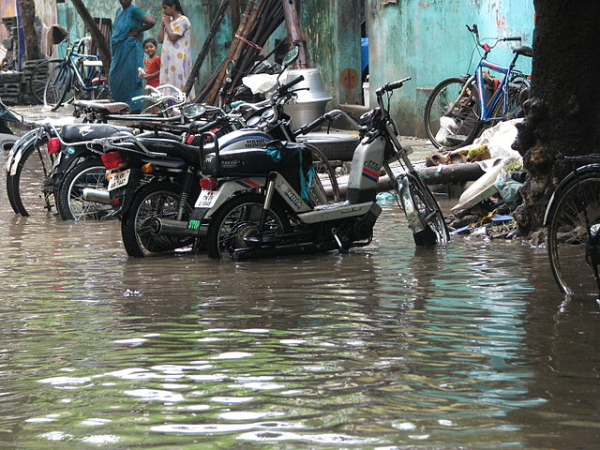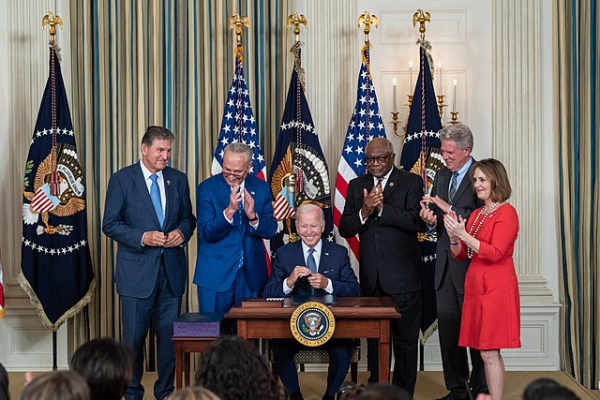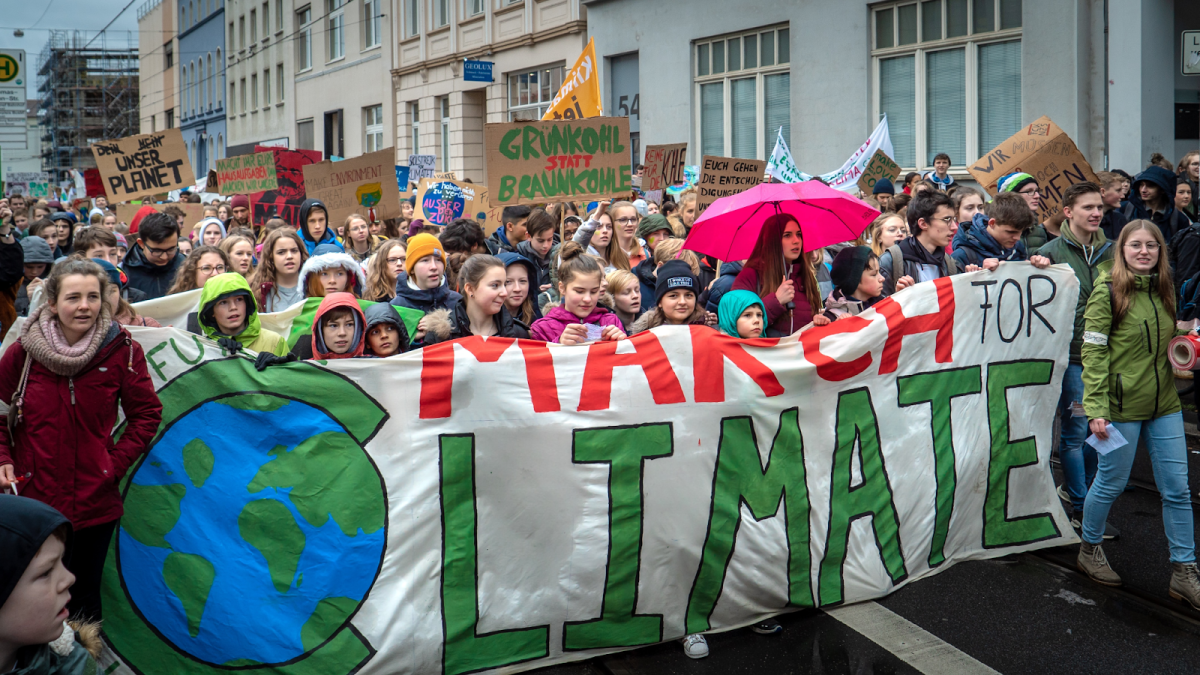“Wow, it’s snowing in Israel and on the pyramids in Egypt. Are we still wasting billions on the global warming con? MAKE U.S. COMPETITIVE!” And yet, despite Donald Trump’s call for competitiveness, climate change indeed does still exist and has been aggravating.
In the past decade, carbon dioxide emissions due to fossil fuels have risen by 10% and are predicted to follow this trend. The sea level is 5 to 8 inches higher than it was in 1990. Since 1979, Arctic ice has decreased by 3.45 million square kilometers.
But these are just numbers — digits, yet another way of measuring the damage we’ve done. Every one of us can feel climate change in the way the summer air feels like syrup. It’s the way we frantically call our families after we hear there are droughts in Somalia, floods in Pakistan, earthquakes in Turkey, or fires in Greece. It’s how we reassure ourselves that it has to get better, we will adapt, our leaders will fix this – all words of false reassurance told to protect our peace.
But what climate action, or the lack thereof, really comes down to is the viewpoint we take. Whether it is globally, nationally, or simply in our communities, every one of us has a different idea of how climate change should be addressed, and until we come to a consensus, nothing can change.
Obstacles to Global Climate Agreements
Action taken against climate change is affecting the entire world, and that’s due to the nature of international agreements. It’s extremely difficult to come to agreements between countries with different wants, needs, and possibilities, and these agreements become even more difficult when the entire world needs to be on board.
One reason why climate policies are so difficult to agree on globally is due to the weaponization of oil. Oil is an essential global resource and the most important source of energy throughout the world, despite its harm to the environment. According to Statista, “The global demand for crude oil (including biofuels) in 2022 amounted to 99.57 million barrels per day and it is projected to increase to 101.89 million barrels per day in 2023.” The high demand shows that many countries are still highly dependent on oil, making oil a point of leverage in many international negotiations and putting countries with more oil at an advantage.
Additionally, although green technology has progressed immensely to the point where it’s become cheaper, healthier, and even more economically rewarding, many countries still rely on nonrenewable energy. The UN finds that 6 billion people live in countries dependent on fossil fuels, which amounts to 80% of the global population. It is a primary source of energy, and although targets have been set to change this, the fact remains that leaders automatically prefer fossil fuels. Additionally, sources have put forth the argument that it is unfair to expect less developed countries to reach the same net-zero targets as more advanced countries, such as China.
However, what this argument doesn’t take into consideration is that encouraging developing countries to rely on fossil fuels is an antiquated argument that only perpetuates harm. A report from the Harvard T.H. Chan School of Public Health states that fossil fuel pollution is responsible for 8 million deaths worldwide, a burden that will disproportionately affect developing countries if they are encouraged to use fossil fuels. Additionally, environmental damages caused by drilling are very costly. Fortunately, several third-world countries have shifted to embracing renewable resources. For example, Costa Rica derived 99.78% of its energy from renewable resources in 2020, a remarkable feat.
I could go on and on listing efforts made by countries, remarkable statistics, and amazing quotes by politicians, but to truly grasp the effect of the climate crisis worldwide, you need to speak to the people. Gauri Gupta ’26 speaks on the effects of climate change on her family in India. “When the Canadian wildfires happened,” Gupta said, “everyone was saying ‘it smells like India out here’. India always kind of smells like smoke. I think the air quality is pretty bad. Also, the rainstorms and monsoons have only been getting worse over time, especially because of climate change. You can’t see it getting worse and worse every year, but you can feel it. Especially because it’s so hot every single year. It’s crazy hot, like in the summer. And then you see videos of the floods and everything happening and you know it’s only going to get worse. Whenever I went there, I never really noticed it because of how young I was. But comparing it to here and how it used to be, I definitely see a difference. I know people whose houses have gotten flooded, but they expected it.”

When asked about the way the climate crisis is portrayed in the media, Gupta said, “A lot of politicians do talk about climate change in India, and they do talk about it, because obviously, it’s a more pressing issue. But it’s kind of similar to the situation where people know that climate change exists, but it’s not that deep to most people, even with flooding affecting people’s lives.”
We can all relate to this sentiment. Around the world, people continue to be affected by horrific natural disasters that have become more frequent and severe because of climate change, but strangely enough, countries worldwide still have not prioritized climate change as an issue, even though it’s taking a noticeable toll on lives and the economy. The only way a change can be brought about is by collective action.
The most important international agreements so far, as cited by the Council on Foreign Relations, have been the Montreal Protocol (1987), the UN Framework Convention on Climate Change (1992), the Kyoto Protocol (2005), and the Paris Agreement (2015). The question we should be asking is, why is this list so short?
Political Divisions over Climate Action in the United States of America
Climate change is one of the most polarizing issues in America, both in terms of foreign policy and political standpoints. Democrats and Republicans are divided on the importance of climate change, how it should be dealt with, and its overall ‘rank’ in the everchanging ladder of importance of issues. There are many statistics to show their contrast in thinking.
The Chicago Council on Global Affairs states that 81% of Democrats believe that the U.S. should act as a leader in limiting climate change, and 82% believe climate change to be a critical threat. In contrast, 31% of Republicans support the U.S. taking on a leading role in limiting climate change, and only 16% consider it a critical threat. Additionally, 70% of Democrats prioritize climate action over economic growth, whereas 68% of Republicans prioritize the opposite.
Do Democrats And Republicans Agree On Anything About Climate Change And Immigration? states that when Democrats and Republicans were asked how to deal with climate change, 89% of Democrats said that we should take action today to mitigate future impacts, while 57% of Republicans said that we should adjust to changes in our climate as they come along.
Obviously, Republicans and Democrats disagree on a variety of issues. These viewpoints are reflected in legislation passed by each party. The most notable example is Democrats passing the Inflation Reduction Act, which allocated 300 billion dollars, the largest climate policy investment made in U.S. history, to cutting carbon emissions by 40% by 2030 and introducing an electric vehicle tax credit. On the flip side, the House of Republicans recently passed legislation that increases the domestic production of oil, coal, and natural gas, which sets back Biden’s current agenda.
Presidents have also made influential decisions on climate change depending on their political beliefs. According to a New York Times report, Trump completed during his time in office over 100 policies that have reversed climate progress. The effects of this include more lenient regulations and restrictions, permitting more extraction of fossil fuels, and rejecting bans on toxins. This isn’t to say that, under Trump’s Republican presidency, only harmful legislation has been passed. In fact, Trump signed the Great American Outdoors Act, which provides up to $1.9 billion a year until 2025 and from then on permanently funds $900 million every year to national parks and wildlife. However, the fact is that most of Trump’s legislation remains harmful to the environment, and this is fueled by his political beliefs.

On the other hand, the most notable climate legislation under Biden’s Democratic presidency is his passing of the Inflation Reduction Act, the biggest climate law ever passed. It includes $369 billion that will lower energy costs and aim to cut greenhouse gas emissions by 40% by 2030 in the U.S.A. Although Trump’s, Biden’s, and any other president’s progress isn’t as clear cut as “good” or “bad,” it is very clear that their personal and political beliefs on climate change affect the legislation they pass, which in turn greatly affects our country and world. Right now, we have reached a “turning point” in terms of the progression of the climate crisis, as we are seeing more severe effects and more recognition worldwide. The root of the problem isn’t just damage being done to the climate. To fix this crisis, we will need to address the democracy crisis and the continuous deception regarding climate change.
Al Gore, former Vice President and avid environmentalist, speaks about the obstacles to fixing the climate crisis in a New York Times interview. He believes that, in order to properly address the climate crisis, “we have to spend time addressing the democracy crisis because our processes of self-government have been sabotaged by the introduction of vast amounts of special interest money.” This corruption and selfish interest on our politicians’ part may well be the reason why it is so difficult for climate laws to be passed. He continues that “the Supreme Court decisions that allow secret, dark money donations to politicians without any record of where it’s coming from and who’s paying for it [has] enabled some of the special interest motivated by pure greed to be able to distort the political process in America, even when the vast majority of American people disagree with what they’re doing to their policies.” Even though a majority of Americans believe climate action is imperative, our government, designed to represent the will of the people, has not taken the necessary action.
Disagreements in political viewpoints make it very difficult for major decisions and agreements to be reached. In a crisis as life-changing and potentially destructive as the one we are facing right now, there is no time for political disagreements, because these will ultimately affect every single form of life on the planet. The only way we can move forward, both technologically and politically, is by agreeing on the common desire to make a change and the collective understanding of the urgency.
Students’ Role in Climate Action
However, as daunting as this problem may seem, everyday people, including students at Bronx Science, can make a difference. And it’s been clear that efforts have been made. There are many recycling/composting bins in the cafeteria, each precisely labeled to reduce waste. Sometimes, in the auditorium, there are presentations aimed to educate students on climate change. These efforts, although notable, still feel insufficient.
Zachary Meryn ’25 said that climate change has been “brought up in passing” by teachers. “I think I had a Spanish project on it once,” he recalled, “and there was a unit that my teacher had on ecology. I don’t think the goal was ever climate education itself – the means was to get to another point.” This is a sentiment we can all relate to, whether it is at Bronx Science or other schools around the country. Climate action in schools means more than just a lesson once in a while, or a brief slideshow, or Climate Action Days that have recently been adopted by David Banks. The more important changes are the ones that aim to make schools greener.
In September 2021, Governor Kathy Hochul allocated $59 million to a Clean Green Schools initiative. The EPA’s Clean School Bus Program provides money to replace current school buses with low-emission ones. These are the kinds of policies that we need in schools. When adopting such policies, youth realize that these changes are important, so when they go home, they try to follow suit.

Laura Schifter, speaker and policy consultant, states, “The strategies that the kids we learn in school, they’re taking home and they’re talking to their parents like, ‘Hey, we have this rain barrel at school, can we have rain barrels at home?’ or, ‘We’re composting at school, can we compost at home?’” In other words, the policies we enact show youth the path that we, as a society, want to take, and the changes we believe are important. Schools are necessary to educate our youth, and right now, we need to be educating them to make a difference for the good of our planet.
In an era where it feels like things are out of our control and everything we do will create a monumental impact, it can feel scary to want to make a change. However, we can gain hope from the fact that people around the world are trying. Youth in Montana sued the state over the extraction of fossil fuels. Citizens in New York are protesting for climate change. Politicians around the world are advocating for change. Billions of dollars are funneled into green technology efforts.
But the first step is caring, believing, and knowing that a change is imperative. Because it is our viewpoints that drive our actions, and it’s not too late. As Al Gore said, “It ought to be seen as a privilege to be alive at a time where those of us on this planet have an opportunity to do truly historic things to save the future of human civilization.” So let’s do it.
In an era where it feels like things are out of our control and everything we do will create a monumental impact, it can feel scary to want to make a change. However, we can gain hope from the fact that people around the world are trying.

